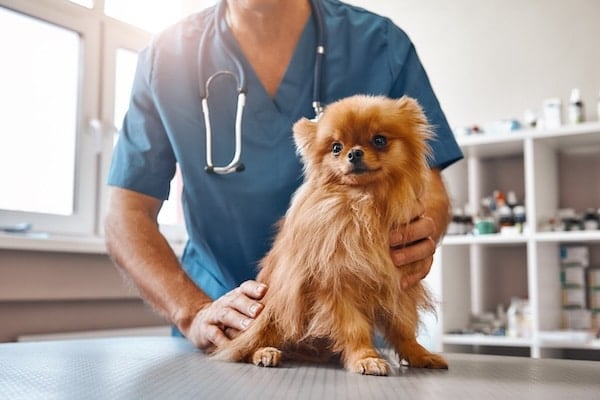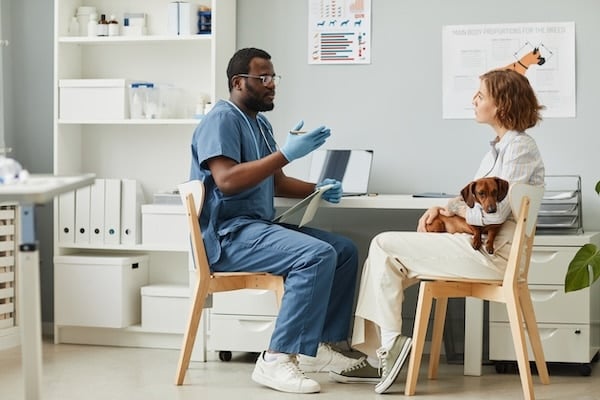- Not a substitute for professional veterinary help.
It takes a team to raise a dog, and a good vet is one of the most important players. Whether it’s your first visit or you’re well-experienced with taking your doggo into the clinic, knowing the best questions to ask your vet can help you get a complete picture of your pup’s health.
Often, your initial visit to the vet will be for your puppy’s first checkup. These wellness visits typically begin at six or eight weeks and include a comprehensive head-to-tail physical examination, as well as your pup’s first rounds of vaccinations. Getting in the habit of asking your vet questions during these initial checkups can help you feel confident to speak up as your pup gets older.
To learn more about the various types of questions to ask during different vet visits, we spoke with Dr. Nell Ostermeier, a veterinarian and advisor at Figo Pet Insurance. Continue reading to discover what you should ask and when, including information on health and treatment options, costs, and bill breakdowns.
What To Ask at an Annual Wellness Checkup
Once your pup finishes all their vaccinations, you’ll want to bring them back in for a checkup at six months, and then again at one year. After that, you’ll take your pup in once a year so your vet can check their vitals, perform a physical exam, and keep them up to date on vaccinations. Here are some things to ask during these visits.
Is my dog a healthy weight?
Maintaining a healthy weight has a significant impact on your dog’s overall health. Your vet can help determine, based on your dog’s breed, health, and size, what their ideal weight should be and how to achieve or maintain it. These discussions may include your dog’s body condition score, the amount of exercise they need, and the appropriate feeding amount based on their breed and activity levels.
Are these physical changes healthy?
Asking your vet questions about changes in your pet’s mobility or appearance can help you quickly address any issues, explains Dr. Ostermeier. “These are often clues to possible negative changes in your pet’s health,” she adds.
Between your appointments, she advises jotting down a list of the apparent changes so you can remember all the details to tell your vet. This might look like new lumps, hot spots, hair loss, limping, difficulty getting up, or any other physical changes you’ve noticed.
Dr. Ostermeier also recommends asking about tests and screenings for early detection. “Diagnostic tests are the best way for us to continually assess the internal health of your animal,” she adds. “They’re also the best chance for early detection of diseases and dysfunction.”
Are these behavioral changes a concern?
Sudden changes in your dog’s behavior can also be a cause for concern and should be discussed with your vet. Perhaps your dog’s sleeping, eating, or bathroom habits have changed. Or maybe your pup is suddenly acting aggressively, having big reactions to new things, or showing sensitivity to touch. These symptoms could all be indicators of pain or other underlying health issues.
How are my dog’s teeth?
Like humans, dogs’ dental health impacts their overall well-being. That’s why it’s important to keep your dog’s teeth clean at home by brushing them regularly. When your vet checks your pup’s teeth during your routine visits, ask if any changes should be made to your dental routine. Your vet may also recommend or schedule professional cleanings to remove built-up plaque and tartar for better dental health.

Artit_Wongpradu via iStock
How is my dog’s diet?
Asking your vet questions about your dog’s diet at annual checkups ensures your pup is getting the right amount of nutrients. Now’s the time to ask about adding any new supplements, switching to a new food type (like from dry to fresh), or what to do if you suspect your pup has a food allergy.
Dr. Ostermeier notes, however, that there are many differing opinions regarding diet, so it’s a good idea to find a healthcare provider who’s on the same page as you. “Finding a vet that shares your similar outlook on nutrition or who is interested in talking about nutrition will serve you better if you are a pet parent who is super interested in this topic,” she adds.
Does my dog need any vaccines or immunizations today?
Keeping your dog’s vaccinations up to date is crucial in helping ward off dangerous diseases, like rabies, parvovirus, and distemper. Your vet can also help you decide if your pup needs any additional immunizations, depending on your lifestyle or location. For instance, dogs who attend doggy daycare or stay at boarding facilities will need to keep their Bordetella shots current to protect them from kennel cough.
Should we change my dog’s supplements or medications?
Annual appointments are an ideal opportunity to reassess your dog’s medications or supplements, particularly if they’re not as effective as they should be or are causing side effects. For example, it sometimes takes a while to figure out the correct dosage or combo of behavioral medications for anxiety or reactivity.
Alternatively, you may want to discuss new monthly parasite protection if you relocate to an area where certain parasites are more prevalent (e.g., some tick preventatives may not be effective against the specific ticks in your region).
Your senior dog may also need to start taking medication to address new health concerns, such as arthritis. “Your veterinarian should guide you as to what changes need to be made as your dog ages,” says Dr. Ostermeier. “If you don’t think your vet is addressing age-related topics, just ask.”
Can you explain my bill?
Don’t hesitate to ask your veterinary clinic questions about your bill. You may want to know what certain charges are for, the breakdown of specific procedures, or if the cost covers additional follow-up care.
If there are abbreviations or medical terms on the bill that you don’t understand, ask your vet to clarify them. Understanding the cost of your vet visit can help you know what to expect for future visits.
Anything you want to know about your pup—no question is too silly!
What might seem like a small thing could be a sign of a larger health issue for your pet. Regardless, voicing your concerns, even if they seem silly, will help you gain peace of mind.
You’ll have to be the one to speak out, too. “Many vets think that pet parents are hoping to get in and out of the visit, spending as little as possible,” said Dr. Ostermeier. “So, if you want to discuss any ‘extras’ that may benefit your pet’s plan, it’s best to ask.”

dima_sidelnikov via iStock
Puppy’s First Visit
A puppy’s first wellness visit typically occurs when your pup is 6-8 weeks old. These visits can seem like a whirlwind, so it’s best to think about the questions you want to ask your vet for your new puppy ahead of time. For instance, on your pup’s first visit, you may want to ask your vet or vet tech questions about the following topics:
- Can I get my puppy microchipped? If your pup isn’t already microchipped, ask if your vet can do it at your puppy’s first checkup. It’s a simple procedure that doesn’t require anesthesia and is usually painless for your pup.
- What will my puppy’s vaccination schedule look like? Puppies require multiple vaccinations in their first few months. Be sure to consult with your veterinarian about your pup’s schedule so you know what to expect and when to schedule appointments.
- Can you show me how to groom my puppy? Your pup’s first checkup is a great opportunity to discuss your pup’s grooming needs. If you don’t know how to do a specific thing, like brushing your dog’s teeth, cleaning their ears, or trimming their nails, ask your vet or vet tech to show you how to do it. You can also ask them if your pup’s coat requires regular grooming appointments if you’re unsure.
- When should I spay or neuter my pup? Most puppies are spayed or neutered within their first year. However, their size and breed will determine their particular timeline. Your puppy’s first visit is an excellent opportunity to ask your vet when they recommend having the procedure done so you can get a good idea of the timing and costs.
What To Ask at Concern-Related Exams
Outside of yearly appointments, you can call your vet with any concerns or questions about changes in your pet’s health. Whether it’s a simple solution they can answer over the phone, or you need to bring your pup in, your vet is your partner in keeping your dog healthy.
Here are some standard questions to ask your vet if you’re bringing your pup in for a specific issue or concern (e.g., limping, lack of energy, skin rash):
- What caused this issue? Discussing the root cause of the health problem may help you prevent it from happening in the future.
- What treatment options are available? Ask about the pros and cons of each one as well as the costs.
- What is the expected outcome of the treatment? This question will help you set realistic expectations about the healing process.
- How long will treatment last? Understanding how long you’ll have to administer medicine or treatment is crucial to helping your pup feel better again.
- What are the signs that the condition is improving or worsening? Knowing what to look for can help you act quickly if your dog isn’t showing improvement.
- What would indicate that I need to bring my dog in for a return visit, and what symptoms should I continue to monitor? Similarly, knowing when to bring your pup back to the clinic will help you stay better informed on your dog’s condition.

SeventyFour via iStock
Expense-Related Questions To Ask
Vet bills can be expensive. Asking questions and understanding what the costs entail ensures accuracy, keeps you informed, and helps you manage your finances effectively. Here are some questions to ask.
- Are there less expensive versions of these medications? Sometimes, there are alternative options that better fit your budget. Be upfront about what you can afford and ask your vet if there are other options.
- How might these costs change over the course of my dog’s life? A dog’s health needs change over time. As your pet ages, they may require more care, medications, and vet visits, which could increase the cost of your yearly vet bill. If new health issues arise, consult your veterinarian about a typical treatment plan and the average annual cost.
- What should I budget for next time? If you know your pup is going to have a specific treatment or procedure (professional teeth cleaning, vaccination boosters, etc.) the next time you visit, ask your vet clinic if they can help you estimate the future cost.
- Do you offer any payment plans? More extensive treatments, such as surgeries, can come at a staggering price. If you’re struggling to cover the cost of a procedure, ask your veterinary clinic if it offers a payment plan to spread the cost over time. Some clinics have in-house payment plans, while others may partner with third-party financing companies.
- Do you recommend any specific pet insurance policies? Pet insurance can help you better cover those bigger expenses, too. If you’re still shopping around for a plan, ask your vet if there are any that they specifically work with or would recommend. Just remember, the sooner you sign your pup up for pet insurance, the more things it’s likely to cover!



